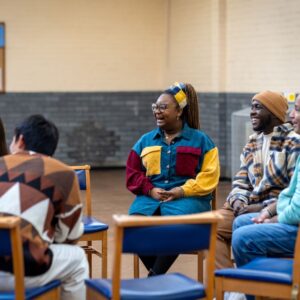If you’ve been following The Center for Transforming Engagement, you’ve likely heard mention of the three streams of resilience: people, practice, and purpose. Each are a necessary component of resilience; no one is sufficient on its own.
This article is part two of a three-part series covering the three components that we, The Center for Transforming Engagement, have identified that help people to remain resiliently flexible. (you can find parts two and three by clicking the links below)
1. Peers who offer a community of support;
2. Practices that contribute to health of body, mind, and spirit
3. Purpose in our work that meets meaning in our life’s
narrative.
I always talk about ‘people’ first because it’s the most vital. Although people, practice, and purpose are important, the prioritization really begins with people, people, people.
The Importance of Practice in Resilience
While people may be the most important, practices is the biggest category. Practices include: caring for spiritual, emotional, physical, relational, and mental health. These practices of wellbeing are found in most frameworks for resilience but are often broken up into 8 or 13 or 20 ‘steps to become resilient’ which dilutes their impact and can set one up for failure.
If there are eight discrete practices I have to check off a to-do list that repeats every day, I’m inevitably going to miss one of them. And then I’m going to feel like I’m failing. Which means my brain will start looking for and amplifying to me all the ways I fail, all the time, because that’s what brains do: they look for confirmation of what they already believe.
Instead, we talk about ‘practices’ as a singular, though complex, stream of resilience. The more we learned about the interconnection of spiritual, mental, emotional, physical, and relational wellbeing, the less sense it made to keep these practices distinct from one another.
Connecting the Spiritual, Mental, Emotional and Physical Practices
Meditation
Meditation is typically considered a practice for mental health, and it does increase attention span and reduces memory loss. But it also lowers blood pressure and improves sleep (physical health), lowers depression and anxiety (emotional health), and generates compassion and kindness (relational and spiritual health). 1
Running
Running is a rather physical practice with all sorts of benefits that I won’t bother repeating here, also improves mood by increasing the natural production of endorphins (emotional health), and more anecdotally, perhaps running is beneficial for spiritual health.
Religious Services
People who attend religious services (spiritual and, arguably, relational) live, on average, 6 years longer (physical), and report being happier (emotional), and are more likely to join other community organizations (relational).2
Relationship
Close friendships increase your sense of belonging (relational health) — not surprising. They also improve self-confidence and happiness (emotional health), and your sense of purpose (spiritual health) — sure. But they also promote immunity to disease, improve heart health, and increase lifespan (physical health). Regular interaction with others who care for you, notice your wellbeing, and encourage healthy habits is perhaps the best practice you can gift yourself.
The more research that is done on any of these practices, the more we learn that mind, body, spirit, and relationship are so intertwined, it hardly makes sense to talk about practices separately. Everything from your morning cup of coffee to your prayer practice impacts you physically, mentally, emotionally, and has repercussions on the systems and people all over the globe — which is as large a definition as I can imagine for relationality, and as tangible as I can imagine for spirituality.
Everything — absolutely everything — is formational.
The question, then, isn’t “Will you engage a practice?” but rather “How are your existing practices forming you and the world around you?”
You are in formation — but towards what?
I imagine that there is one change you could make in the regular rhythms of your life practices. You probably know what it is; we all know what we should be doing: more vegetables, less sugar; more water, less caffeine and alcohol; more movement, less sitting. We all know the facts about how much sleep is necessary for a human body (yes, even your human body).
There’s good news: one change is enough.
You don’t need to overhaul your entire life to begin to care for yourself well. I recently stopped drinking coffee (I know) to drink more water — a practice that is supporting my health in multiple ways. Water is great for everything in a body, from heart health to supple skin; dehydration is connected to lowered concentration. And given that Spirit hovered over the waters before creation, and that with water we remember our baptisms, and that — when I’m mindful — I remember the millions who don’t have access to clean water, and remember to be grateful for this essential element… I believe it’s also engaging my spirituality.
Over time, a singular new practice becomes a habit, and then we can focus on the next one. What matters is committing to your practice and, well, practicing it. It doesn’t matter what your entry point is — you know what you need. The thing you’re thinking of right now is perhaps the one that you should focus on next. Make it a commitment to yourself first. Write it down and put it in the cover of your notebook, a sticky note by your computer monitor, next to where you wake up each morning, on a bookmark, or where you put your coat in your office. Give yourself a regular reminder to practice.
And tell another person — remember, people, people, people. Ask someone safe and trustworthy about the practice you’re intending to adopt, and let them know how you would like them to engage you about it. Perhaps you could ask for curiosity over accountability. For them to celebrate when they see you engaging the practice, to point out the positive impact they see from it, and also to be curious when they see you not engaging it: What’s getting in the way of your new practice?
Which is perhaps the core question of practices for any of us. We all know what it is we “should” be doing. Why don’t we engage the practices that positively impact our wellbeing?
The answer is deeply tied to our story, our woundedness, the ways we had to cope to survive in difficult circumstances, and the ways we learned to comfort when none was offered. Our practices towards wellbeing are long-term investments, ones that requires attention and care to avoid sacrificing long-term wellbeing for short-term coping.
Learn to engage others, and yourself, with greater compassion.
If you could use companions on the journey who are curious about the nuances of story, join us at The Center. Resilience circles offer a unique, transformative journey of personal growth, connection, and resilience. Go here to get more information on resilience circles.
You can also download The Center’s valuable resource: The Resilience Report to explore more about the three components of resiliency.
Resources
1-There are so many studies showing the benefits of meditation, it’s worth googling “benefits of meditation.”
2- Are religious people happier, healthier? Our new global study explores this question










0 Comments